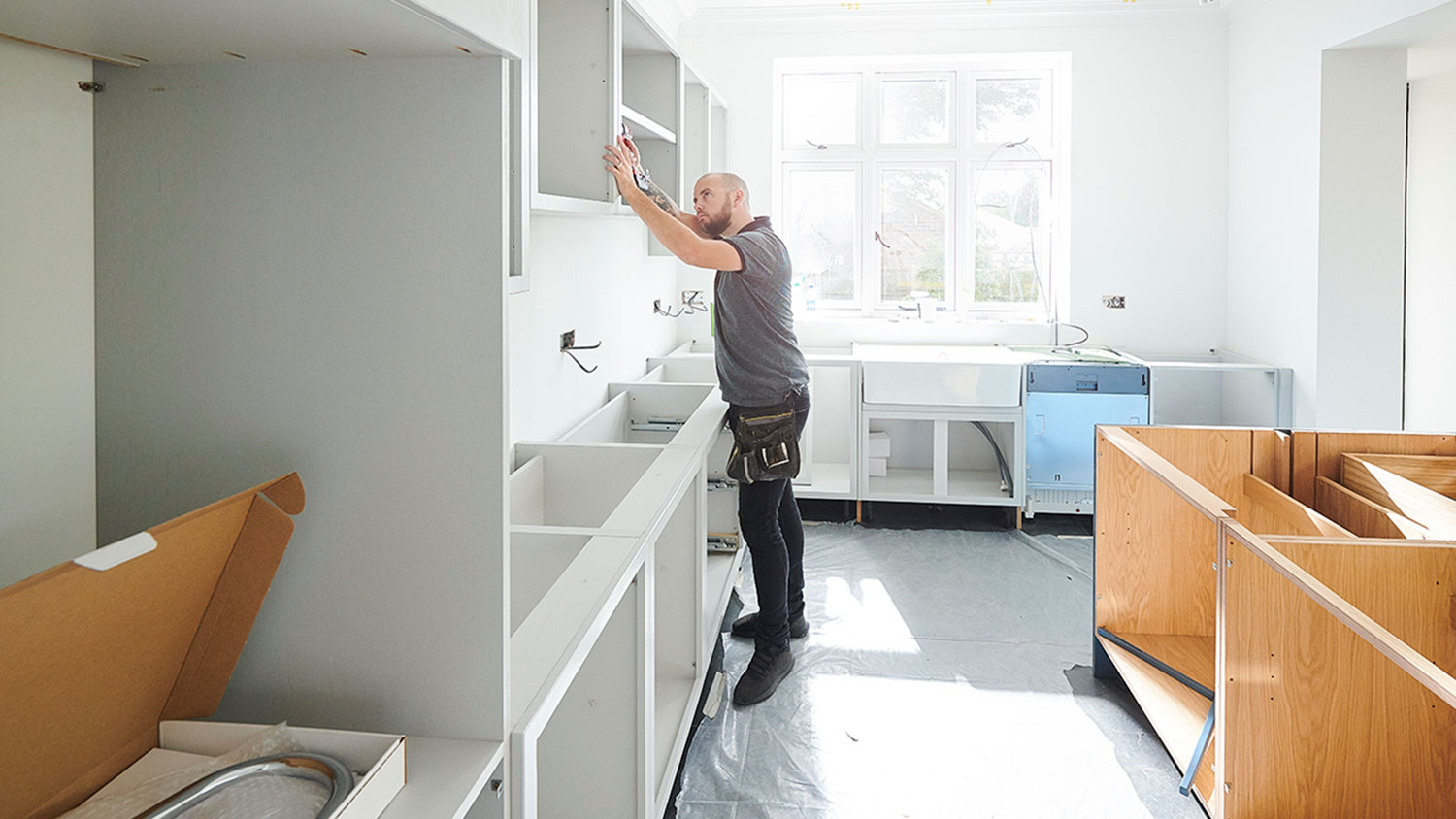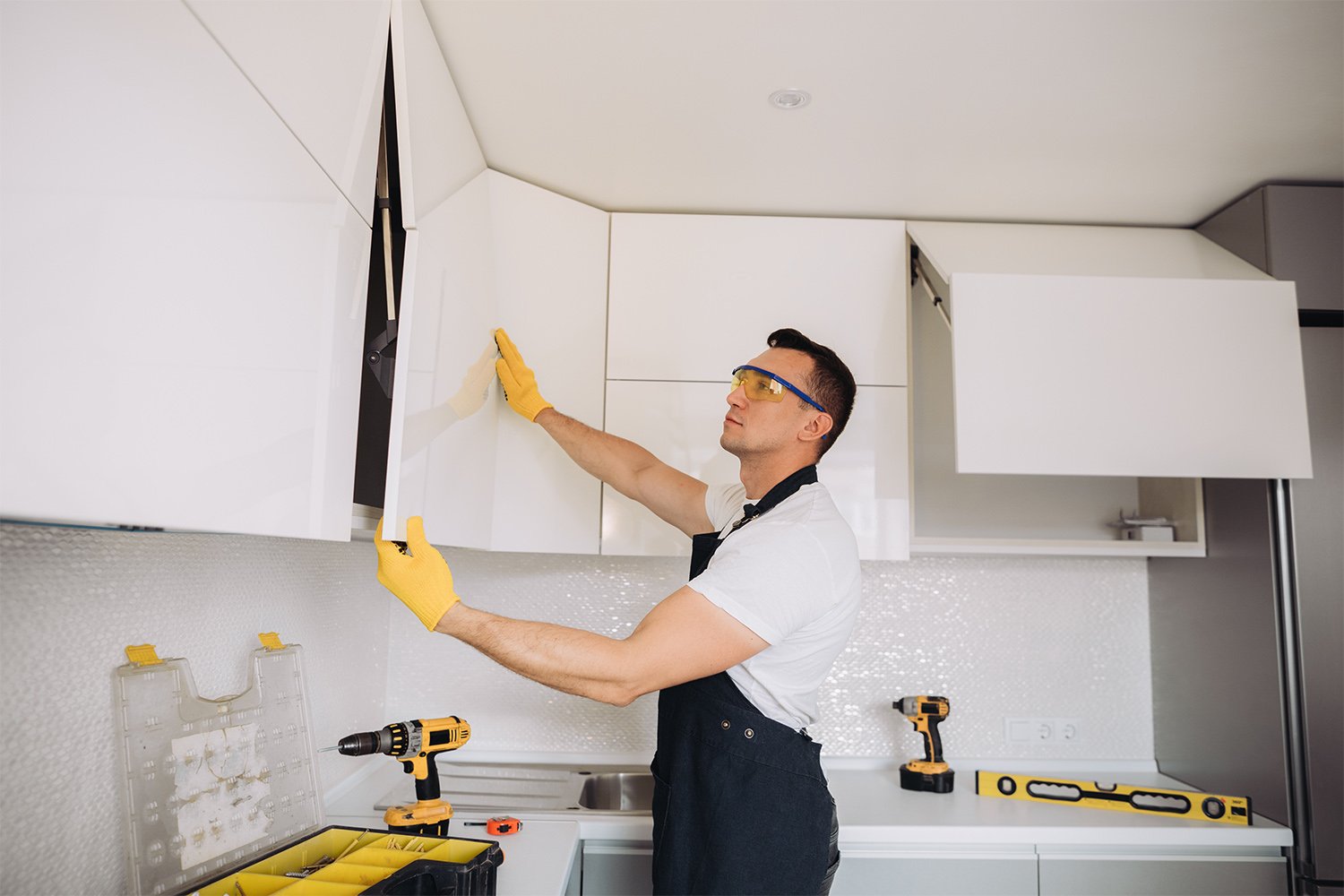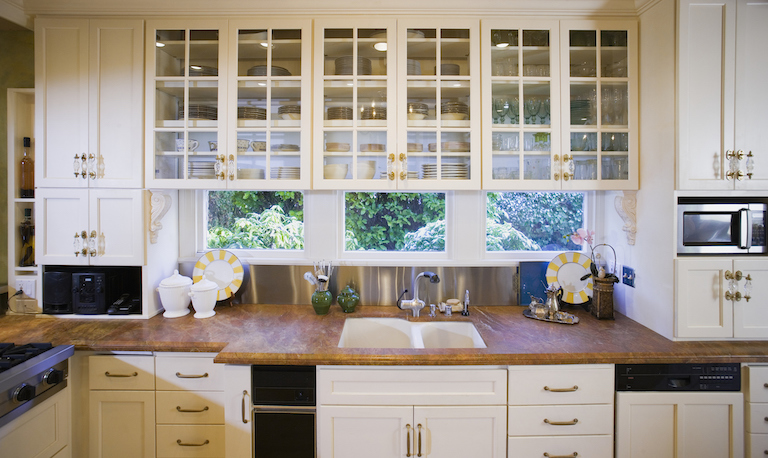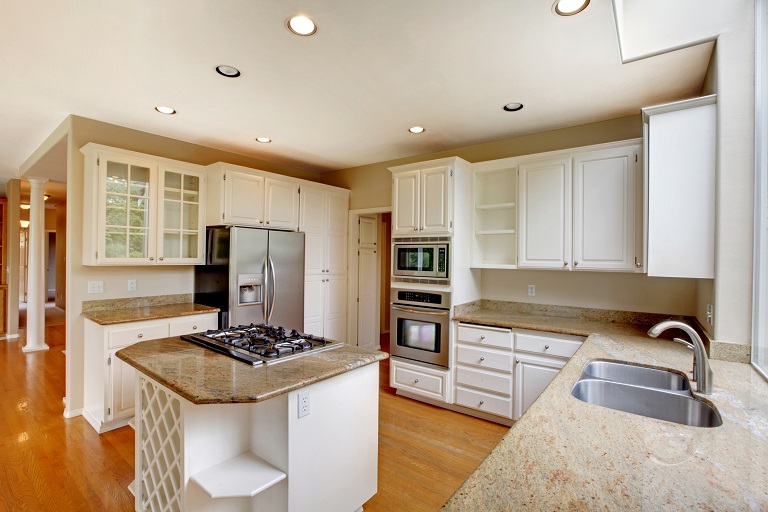
Discover cabinet installation cost estimates, including average prices, key cost factors, and tips to save on your new kitchen or bathroom cabinets.
Choose someone with a strong portfolio, good reviews, and valid licenses


New kitchen cabinets are a big investment, and you’ll use them every day, so it’s worth it to find a skilled contractor who won’t cut corners. To establish a contractor’s credentials, check their reviews, license, and portfolio before asking them questions about their services and experience. Get quotes from at least three pros to help you evaluate the best company for your project based on your budget.

If you’re buying your cabinets from a showroom or a big box store, they’ll have a list of vetted cabinet contractors near you, which is a good place to start. If you’ll be hiring a contractor to measure, design, build, and install your cabinets, start by asking around. Personal recommendations are a great way to find a contractor, so reach out to anyone you know who had their cabinets redone in the last decade and ask them for a recommendation—assuming you like the final result. And if someone else’s home has inspired your remodeling journey, be sure to ask them who did their cabinets.
Learn more about what kind of work each potential contractor does, and only consider cabinet installers with experience working on the type of cabinet you need. For example, just because someone installs stock cabinets doesn’t mean they have experience building custom cabinets.
Always get estimates from at least three reputable contractors but before you do, map out a rough plan for your cabinet design and create a project budget. By knowing what you want ahead of time, you can get a fair comparison of each contractor’s services, ideas, and prices. You don’t want to compare one company’s cost for 100 linear feet of solid oak against another’s for 50 feet of MDF cabinets.
Provide each contractor with as many details as possible such as your preferred cabinet styles and materials, any brands you want to use, and details about your countertops. Ask them to include price breakdowns in their estimates so you can better understand what’s going into the final cost. Also, request their projected start and finish dates so you get an idea of how long the project will take.
Verify that each contractor on your shortlist is qualified to handle the project. Start by checking customer reviews of each company. While reputable companies may occasionally have negative reviews, a good company will typically make an effort to remedy the problem. If you see multiple customers complaining about the same issue, this is a good sign that you should find a different contractor.
Check that each company is fully licensed, bonded, and insured—and never hire one that isn’t. You should be able to find this information by checking with your state or city licensing agency. Alternatively, you may want to call the company and request their license number and proof of their bonding and insurance.
Next, call and ask for a list of references, then ask these individuals how long the project took, whether they are satisfied with the completed work, if the contractor stayed within their proposed timeline and budget, and how the company handled any problems. Personal recommendations are handy in these situations since friends and family members will typically be honest about any issues they had with a contractor. If possible, try to see the work in person or, at the very least, review photos of the completed projects. Custom cabinet makers may have a showroom or workshop to show off their artistry.
How long have you been in the industry? Some experienced contractors may have only set out on their own recently but may have previously worked for another company for years.
What percentage of your customers come from referrals? A contractor that does great work will frequently get hired through word of mouth. The higher this number, the better.
What is your change order process? Unpleasant surprises are common in the construction industry, and you should know what to expect when something unexpected occurs.
What are your payment terms? Most contractors will expect a down payment of 30% to 50% of the budget, and a similar portion should be withheld until after the project has been completed. They should also be upfront about what payment methods they accept.
Who will be working at the site? Some cabinet installers work alone, while others work with a larger team to speed up the process. If they subcontract out some of the work, get details about who they use.
What is your timeline, and how many projects are you handling right now? The best contractors will have plenty of other clients, but you need to know how long you must wait.
Do you offer a warranty? If so, what does it cover? If something goes wrong with your cabinets down the line, a manufacturer or labor warranty can ensure you’re not left paying out of pocket.
What permits will I need, and will you pull them? A good contractor will know what paperwork must be filed with your municipality.
Do you install stock, semi-stock, or custom cabinets? The installation process for each of these projects is different. While some installers will work on all three, others specialize in only one area. If a company does all three, ask what portion of their projects are like yours.
Do you do the finishing yourself? Many cabinet makers hire other companies to do the finishing. While there’s nothing wrong with this, you should know more about this third party and what happens if something goes wrong during this process.
Once you interview each of your potential contractors and review all the information you’ve gathered, you’ll be ready to choose the right company for the job. While it can be tempting to base your decision solely on which company has the lowest rates, that shouldn’t be the only thing you take into account—and if one company’s rates are drastically lower than everyone else’s, it could be a sign that they cut corners.
Aside from the final cost, consider how easy each contractor was to talk to. This will give you a clue about what communication will be like during your project. If you have workers in your home or need to resolve a problem, you don’t want to be butting heads.
Never start work with someone without first signing a contract stating both parties’ responsibilities and expectations. Be wary of anyone who doesn’t want to use a contract or has an overly vague one. When you receive a contract from a cabinet contractor, take time to read it thoroughly before signing. A contract for a cabinet project should include:
The names, addresses, and phone numbers of each signing party and any subcontractors
The contractor’s insurance, bonding, and licensing documents
An itemized list of work to be completed with detailed pricing stating the costs of both labor and materials
The estimated start and end dates
The full payment terms, including the cost and due date of the deposit and final payment
Acceptable work hours and rules that must be followed by employees inside the home (if workers cannot use your home’s bathroom and must enter through the back door, for example, this needs to be spelled out)
Details on the permitting process, including who will be responsible for obtaining the permits
Information on the change order process for handling unforeseen circumstances
An explanation of the dispute resolution process in case something goes wrong
Hopefully, once you decide on a contractor, your project goes smoothly. But if problems arise, you must follow the specified dispute process to resolve them. Watch out for these warning signs:
The contractor is aggressive or hard to communicate with
They fail to meet deadlines
The contractor, their employees, or subcontractors are unreliable, showing up or leaving too early or too late (or not showing up at all)
Workers on the job are under the influence of drugs or alcohol
Someone on the job steals from your home
Employees fail to follow proper safety protocols
The materials or methods used on the project are not what was agreed upon in the contract
When the contractor informs you the job is done, the first thing you should do is pull out your contract. Review the terms you agreed to and check that:
All subcontractors have already been paid (unpaid subcontractors can put a lien against your property)
Any itemized bids and change orders add up to the total billable amount
Every task listed in the contract has been completed according to the contract or change order specifications
You have all necessary documents related to the project, such as warranties
Inspect the finished cabinets and, if everything looks good, pay the contractor according to the final payment terms in your contract. If you notice any problems, contact the company immediately and ask them to make it right before paying.
It is hard for contractors to build up their reputations. If you appreciate the work they did, leave a positive review and, if you feel comfortable being contacted by prospective customers, offer to serve as a reference.
The average cost to install cabinets ranges from $2,000 to $10,000, factoring in variables like size, material, and complexity. When estimating the price to install cabinets in your kitchen, measure your space: cabinet installation costs anywhere from $100 to $1,200 per liner foot. The number of customizations will also affect the price, so choosing stock or prefabricated cabinets will be less expensive than custom-built options.
While installing premade or stock cabinets is possible as a DIY project, you will need specific tools and at least one extra set of hands to hang upper cabinets. DIYing will save you money on labor, but you may find this project challenging—and repairs are costly if you make a mistake.
If you don’t have carpentry experience or you plan on customizing your cabinets, hire a local cabinet pro to help with your installation.
From average costs to expert advice, get all the answers you need to get your job done.

Discover cabinet installation cost estimates, including average prices, key cost factors, and tips to save on your new kitchen or bathroom cabinets.

Discover the built in bookcase cost for 2025. Learn about price ranges, installation factors, and ways to save on your custom built in bookcase project.

Discover custom cabinets cost for your home. Learn about average prices, installation factors, and ways to save on your custom cabinetry project.

Discover built-in cabinets cost. Learn average prices, key cost factors, and tips to save on your custom built-in cabinetry project.

You don’t need a professional to teach you how to fill cabinet holes—our guide will have you sanding, filling, and staining like an expert in just a few steps.

Getting stunning glass cabinets doesn’t have to be complicated. Use this guide for seamless cabinet door glass insert installation.